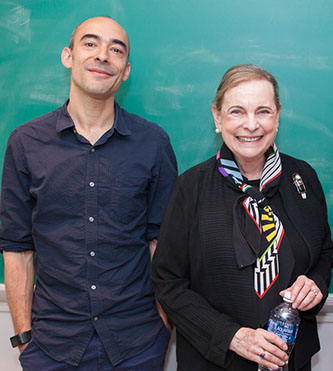Biology Professor Nicolas Biais and Colleagues Identify Mechanism Bacteria Use to Attach to Surfaces
Dec. 14, 2017

Nicola Biais and Lucy Shapiro '61
According to Nicolas Biais, assistant professor of biology at Brooklyn College, most of our knowledge of bacteria comes from the study of bacteria swimming around in liquid. But there is a growing consensus in the scientific community, he says, that how bacteria interact physically with each other and with other surfaces is crucial to understanding their behavior.
A new study published in the journal Science, researched in part by Biais, shows that bacteria can use nanoscale tentacles called pili and a swimming propeller called the flagellum as their sense of touch when interacting with surfaces.
"The flagellum and pili are external tools that many bacteria possess. Flagella are rather thick and enable swimming in water. Pili are much thinner and enable bacteria to crawl on surfaces," Biais says. "Pili are less visible due to their smaller diameter and thus have received less attention in terms of bacterial motility."
In the article, "Obstruction of Pilus Retraction Stimulates Bacterial Surface Sensing," Biais and a group of interdisciplinary researchers from Emory University, University of Lyon in France, and the Georgia Institute of Technology show that in the case of the bacterium Caulobacter crescentus, a model organism that splits its life between swimming and attaching to surfaces, physically blocking the retraction of its pili triggers the bacteria to attach to surfaces.
Two examples of retraction of the Caulobacter crescentus pilus. On the left the fluorescent microscopy technique that enables to see single pilus retracting. On the right the micropillar assay used to measure the pilus retraction forces. Blockage of the pilus retraction indicates to the bacterium that it is close to a surface conferring it a sense of touch.
The scientists uncovered a new technique to observe and film Caulobacter crescentus pili undergoing dynamic cycles of extension and retraction. They were also able to measure the forces exerted by the retraction of these nanometric tentacles and noticed that within seconds of contact with a surface, the cycles ceased. This impediment of the retraction of the pilus coincided with the excretion of the adhesive called holdfast, a chemical glue required for firm attachment.
"The technique used in our study enabled us not only to see the pili in action, but also to artificially block the retraction of the pili to measure the force with which it grips a surface. Even in this case, blocking pili retraction led to the excretion of holdfast,” says Biais, who joined Brooklyn College faculty in 2013 and also teaches at the CUNY Graduate Center. "The exact mechanism between pili and excretion is not yet fully understood."
Biais adds that understanding this mechanism of sensing a surface in Caulobacter crescentus, "might help us understand how other bacteria sense surfaces and control their growth, either to improve it in the case of good bacteria, used for instance in bioreactors, or curb it, as in the case of hospital pathogens growing on medical catheters."
Biais, who earned his Ph.D. at the Université de Paris Diderot, opened a mechano-micro biology lab at the college to study of the role of physical forces in microbiology and where he merges biochemistry, genetics, and molecular biology with the development of new force measurement devices.
"We started this collaboration when colleagues from Indiana University contacted us to characterize biophysically the pili of Caulobacter crescentus, but the study of Caulobacter crescentus as a model system preceded this study by many years," says Biais. "We recently had the chance to welcome Brooklyn College alumna Lucy Shapiro '61, who pioneered the study of this water based bacterium."
The Ludwig Professor in Cancer Research at Stanford University, Shapiro pioneered the study of C. crescentus as a model organism. She received the 2011 National Medal of Science and was part of the biology department's Gavin Lecture in Cell and Molecular Biology last May, where she discussed the 3-D architecture of cell cycle regulation.






